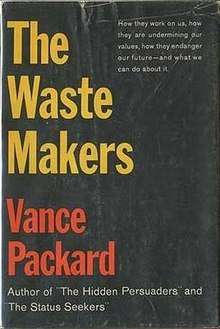The Waste Makers
The Waste Makers is a 1960 book on consumerism by Vance Packard. It was bestselling when it was released. The book argues that people in the United States consume a lot more than they should and are harmed by their consumption.
 First edition | |
| Author | Vance Packard |
|---|---|
| Country | United States |
| Subject | Consumerism |
| Publisher | David McKay |
Publication date | 1960 |
| Pages | 306 |
| ISBN | 978-1935439370 |
Summary
One reviewer summarized the book's thesis as follows:
American society overemphasizes consumption, especially the quantity rather than the quality of what it consumes, and that it therefore sacrifices culture, prudence, and a proper concern for the future. He blames these distorted values on the business community, especially on the marketers and advertisers who have beguiled the public into accepting false standards.[1]
Another reviewer noted:
[...] we overbuy -once we've been persuaded- as industry, facing the ""specter of glut"" for the products they have to sell, force feeds the public through a variety of pressures and mechanisms. These include ""growthmanship"" or needling purchasing appetites; throwaway strategy such as the ""disposable"" concept; and planned obsolescence, whether through styling or the calculated perishability of the product. The artificial aspects are far more extensive and there are sham elements in pricing, servicing, packaging, financing, commercializing to make the hard sell easy and promote prodigality. And the dollar sign on the price tag is not the only price to be paid-- our national resources are being destroyed along with our individual character and our family patterns.[2]
Vance Packard worked to change the meaning of the term "consumerism" from a positive word about consumer practices to a negative word meaning excessive materialism and waste.[3] The ads for his book The Waste Makers prominently featured the word "consumerism" in a negative way.[3]
Reviews
One reviewer said that the book is an examination of how economic growth became thought to be a virtue.[4]
Another reviewer said that the book describes the manipulation of ordinary people by business interests.[5] The reviewer for Commentary noted that Packard had made harsh attacks on businessmen.[6]
References
- Rees, Albert (July 1961). "The Waste-Makers and the String-Savers". The Journal of Business. University of Chicago Press. 34 (3): 367–373. doi:10.1086/294428. JSTOR 2350862.
- McKay, David (Sep 30, 1960). "The Waste Makers by Vance Packard". Kirkus Reviews. Retrieved 11 July 2013.
- Glickman, Lawrence B. (2012). Buying power : a history of consumer activism in America (Paperback ed.). Chicago: University of Chicago Press. p. 265. ISBN 978-0226298672.
- Rondell, Paul (Summer 2000). "Book Review of The Hidden Persuaders and The Waste Makers by Vance Packard". Social Contract. The Social Contract Press. 10 (4).
- Johnson, Daniel (24 September 2009). "Book review: The Waste Makers by Vance Packard". The Salem News. Retrieved 11 July 2013.
- Lipset, Seymour Martin (January 1961). "The Waste Makers, by Vance Packard". Commentary.